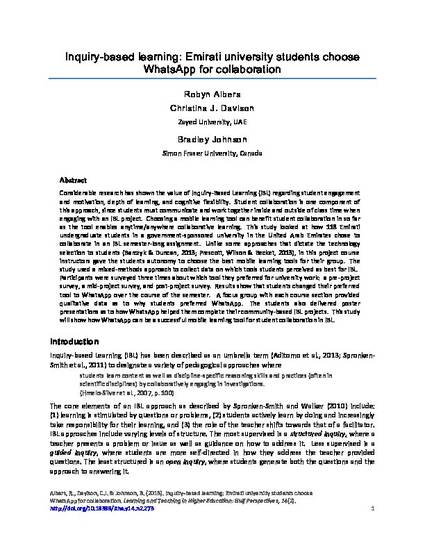
Considerable research has shown the value of Inquiry-Based Learning (IBL) regarding student engagement and motivation, depth of learning, and cognitive flexibility. Student collaboration is one component of this approach, since students must communicate and work together inside and outside of class time when engaging with an IBL project. Choosing a mobile learning tool can benefit student collaboration in so far as the tool enables anytime/anywhere collaborative learning. This study looked at how 118 Emirati undergraduate students in a government-sponsored university in the United Arab Emirates chose to collaborate in an IBL semester-long assignment. Unlike some approaches that dictate the technology selection to students (Barczyk & Duncan, 2013; Prescott, Wilson & Becket, 2013), in this project course instructors gave the students autonomy to choose the best mobile learning tools for their group. The study used a mixed-methods approach to collect data on which tools students perceived as best for IBL. Participants were surveyed three times about which tool they preferred for university work: a pre-project survey, a mid-project survey, and post-project survey. Results show that students changed their preferred tool to WhatsApp over the course of the semester. A focus group with each course section provided qualitative data as to why students preferred WhatsApp. The students also delivered poster presentations as to how WhatsApp helped them complete their community-based IBL projects. This study will show how WhatsApp can be a successful mobile learning tool for student collaboration in IBL. أكدت العديد من البØوث على Ùوائد التعلم القائم على البØØ« والاستقصاء من Øيث المشاركة وعمق التعلم والمرونة المعرÙية. ويعتبر التعلم القائم على البØØ« والاستقصاء شاملا لمÙاهيم عدة منها التعلم القائم على المشاريع وعلى ØÙ„ المشكلات والنماذج الشاملة لطرائق التعلم الأساسية لدى الطالب أهمها التعاون الطلابي لما له أثر جيد ÙÙŠ إنجاز المشاريع سواء أكان ذلك أثناء المØاضرة أو خارجها. كما أن استخدام أدوات التعلم الذكي (mobile learning tool) يعزز التعاون الطلابي إذا ما توÙرت خارج الÙصل ÙˆÙÙŠ أي مكان. وللتأكيد على هذه الÙرضية، قمنا بدراسة أداء 118 طالبة ÙÙŠ المرØلة الجامعية Øين طلب منهم اختيار Ø£Ùضل أدوات التعلم الذكي لمجموعاتهم للقيام بمشروع قائم على البØØ« والاستقصاء. واستخدمت الدراسة منهجا يدمج بين جمع البيانات عن الأدوات التي يعتبرها الطلبة الأÙضل لأدء المشاريع القائمة على البØØ« والاستقصاء. وخضع الطلبة لثلاث مسوØات قبل البدء بالمشروع ÙˆÙÙŠ منتص٠المشروع وبعد الانتهاء منه Øول الأداة المÙضلة لديهم للقيام بالمشارع الجامعية وللتواصل الاجتماعي أيضا. وأظهرت النتائج ان برنامج ال WhatsApp هو الأÙضل على مدار الÙصل الدراسي. كما قامت مجموعة تركيز واØدة ÙÙŠ كل Ùصل دراسي بتقديم بيانات نوعية لأسباب الاعتماد على هذا البرنامج ÙÙŠ أداء المشاريع وإنجازها Ø¨Ù†Ø¬Ø§Ø Ù…Ù† خلاله. كما قدم الطلبة عروضا باستخدام الملصقات Ù„Ø´Ø±Ø Ø£Ø³Ø¨Ø§Ø¨ Ù†Ø¬Ø§Ø Ø§Ù„Ù…Ø´Ø§Ø±ÙŠØ¹ القائمة على تقديم الخدمات من خلال استخدام برنامج ال WhatsApp. كما تستعرض الدراسة أسباب كون هذا البرنامج أداة تعليمية ناجØØ© ومعززة لعملية التعاون الطلابي أثناء القيام بالمشاريع القائمة على البØØ« والاستقصاء.
Available at: http://works.bepress.com/robyn-albers/2/